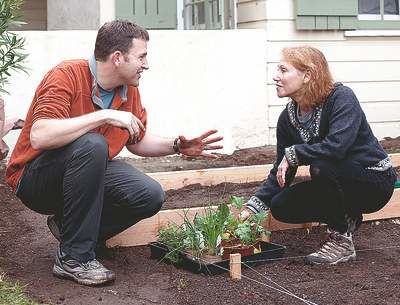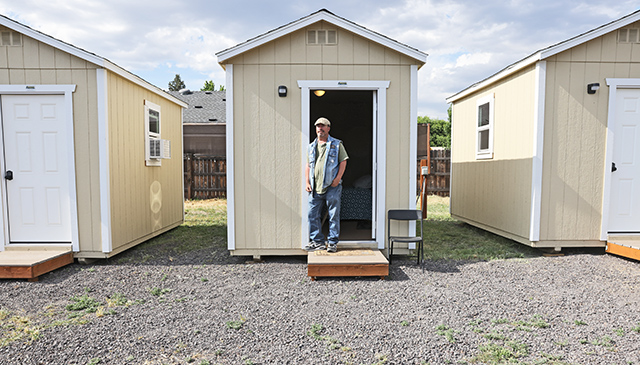Taking on the neighbors — and City Hall
Published 4:00 am Friday, December 21, 2012

- Derek Markolf, left, and April Smith build a garden in front of Smith’s home in Santa Monica, Calif., where gardening is encouraged. In some areas, however, gardeners battling neighbors and assorted city codes and ordinances say they are becoming victims of aesthetic micromanagement.
Jason Helvenston was at work on his second crop, spreading compost to fertilize the carrots, bok choy, kale and dozens of other vegetables he grows organically on his property in Orlando, Fla., when the trouble began.
Helvenston spent last Super Bowl Sunday planting the garden outside his 1940s cottage, in a neighborhood of modest houses close to downtown. Orlando’s growing season is nearly year-round, and Helvenston, a self-employed sustainability consultant for the building trade, said he saw the garden as “a budget thing” — a money-saving supplement to the chicken coop he and his wife, Jennifer, installed a few months later behind their house.
Since his backyard doesn’t get much sun, Jason Helvenston ripped out the lawn in his front yard and installed the 25-by-25-foot, micro-irrigated plot there. The unorthodox landscaping went largely unnoticed for months, perhaps because he lives on a dead-end street next to Interstate 4.
Then, in September, Pedro Pedin, who lives in Puerto Rico but owns the rental property next door, visited with his wife and cast a displeased eye on his neighbor’s front yard.
“All the houses are pretty much kept neat,” Pedin said, “but his house looks like a farm.”
Pedin contacted the city, which cited the Helvenstons for violating section 60.207 of Orlando’s Land Development Code (failure to maintain ground cover on property) and set a deadline of Nov. 7 to comply.
Instead, Helvenston stood outside his polling site during the last election circulating a petition to change the code and then appeared on a local TV news station, telling the reporter and any city officials who happened to be watching, “You’ll take my house before you take my vegetable garden.”
‘War on gardens’
Gardeners aren’t generally known for their civil disobedience, yet in the past couple of years several have run afoul of local officials for tending vegetables in their front yards.
• In Ferguson, Mo., a stay-at-home father was ordered to dig up his 55 varieties of edible plants.
• In Tulsa, Okla., a gardener who didn’t want to remove her veggies and medicinal herbs saw them largely cleared by the city.
• In Oak Park, Mich., Julie Bass, a mother of six, faced up to 93 days in jail for refusing to take out the raised beds in front of her home and plant what the city deemed “suitable” ground cover.
These and other cases have drawn national attention, as well as outrage from gardeners, some of whom have begun referring to the isolated skirmishes as a broader “war on gardens.”
Roger Doiron, the founder and director of Kitchen Gardeners International, a group promoting food gardens, has marshaled support for Bass and others.
“If you define a war as a struggle between opposing forces, this does fit the bill,” he said.
The opposing forces, in Doiron’s view, are progressive-minded gardeners and backward-thinking municipalities.
Gardeners, he said, “need to push back. This isn’t about a single garden; this is about the right to garden.”
Although rooted in something as innocuous as vegetables, these disputes touch on divisive issues like homeowner rights, property values, sustainability, food integrity and the aesthetics of the traditional American lawn. Ecologists and libertarians alike have gotten into the debate, the latter asserting that the codification of gardens is just one more way the government tells people how to live.
Jeff Rowes, a lawyer for the Institute for Justice, a libertarian law firm based in Arlington, Va., that is advising Helvenston, is adamant.
“It’s the micromanagement of land that invades your liberty in a thousand small ways,” he said.
Invoking the nation’s agrarian past, Rowes noted, “Washington, Jefferson and Madison were all farmers.”
Property values
For Pedin, the issue is less about the inalienable right to grow snap peas at home than it is about the prerogative to not stand idly by while your property value plummets. Helvenston’s garden is “messy,” Pedin said, and will attract rats and lower the worth of his rental home. Pedin also questioned Helvenston’s commitment to maintaining the mulch-covered plot.
Helvenston, who is 40 and wears his hair in the same receding-ponytail style as martial-arts actor Steven Seagal, said his green thumb isn’t a whim but a financial necessity.
Anyone who is going to remove his family’s garden, he told a reporter by phone, “might as well kick down our door, steal food from our table and take off.”
Jennifer Helvenston took the phone from her husband.
“We want to be sustainable,” she said.
Jason Helvenston, who has begun referring to his yard as a “patriot garden,” an overt reference to the Victory Gardens planted during World War II, got back on the line, expressing disbelief at the response by Pedin and the city of Orlando: “Who doesn’t like a garden? It’s like punching a baby.”
Municipal codes
Many municipalities have spent the past 50 years drafting increasingly restrictive codes governing their residents’ landscaping choices. Orlando’s code, for instance, specifies that planted shrubs “shall be a minimum of 24 inches in height” and “spaced not more than 36 inches apart,” while berms “shall not exceed a slope of 3:1.” The code goes on to list no fewer than 295 approved and prohibited species.
Opponents like attorney Rowes argue that such strict rules are fine when instituted by homeowners associations, where residents “go in with their eyes wide open,” but codification of a homeowner’s landscaping by local governments can be “oppressive.”
Jon Ippel, sustainability director for the city of Orlando, said the list of approved and prohibited plantings is intended to create permanent landscaping that survives Florida’s climate and keeps out invasive species. As for the enforced homogeneity, Ippel said, the code was written in 1991 and reflects an era when “the aesthetic was more of a formalized thing. Organic, natural planting was out of vogue.” The garden sharing program run by the city of Santa Monica, Calif., where residents are permitted — even encouraged — to plant front-yard gardens, turns out to be the exception, not the rule.
City officials frequently cite public health and safety as the main reasons for zoning codes, but the underlying driver is often real estate.
John Shaw, the city manager in Ferguson, Mo., a suburb of St. Louis, said of zoning codes, “At the end of the day, they’re there to protect homeowners and to protect their property value.”
Last summer, after Karl Tricamo, the stay-at-home father in Ferguson, was informed that his front-yard garden was in violation, he challenged the city and won a ruling from the Board of Adjustment that allowed him to keep his veggies.
Shaw cited the city’s “Live Well Ferguson” program as an example of its progressive attitude toward healthy practices like gardening. It is the residents, he added, who are often in favor of restrictive landscaping codes.
“Some of the largest volume of calls we get are complaints about property conditions,” he said.
In many communities where gardeners face fines, including Orlando and Ferguson, code enforcement officials didn’t initially go after the person planting vegetables in the front yard. It wasn’t until one or more neighbors complained that the city responded by following the law as currently set forth. Much like the chicken coops that popped up in suburban backyards a few years ago, front-yard gardens weren’t an issue until they suddenly became one.
Faced with residents who are adapting to what they perceive as new economic and environmental realities, in ways that don’t always fit the current laws or aesthetic norms, many communities have been caught off guard.
Shaw said flatly, “We weren’t ready for this.”
Doiron, the gardening activist, believes change will come slowly to the traditional lawn, and with resistance from local officials.
“We’re going to pull them kicking and screaming into the 21st century if we have to,” he said.
‘Suitable live plant material’
If there’s a Norma Rae in the war on gardens, a public face the movement has coalesced around, it’s Julie Bass, the 43-year-old Michigan mother who faced jail time for tending a front-yard garden. But as Bass tells it, she was an accidental scofflaw.
When the roots of a tree planted by the city of Oak Park cracked her sewer line two summers ago, Bass had to dig up her front lawn. She hadn’t been opposed to grass, or very eco-conscious for that matter, but replanting “a green carpet of nothing,” she said, seemed like a waste of money. Instead, she and her husband hired a carpenter to build and install five large raised garden beds that covered the yard in front of their small brick house in the inner suburb of Detroit.
First, however, she checked with officials in Oak Park and discovered the code was vague in regard to front-yard gardens. She went ahead anyway. Soon she received warnings and then a letter from the city, citing her under the blight ordinance for failing to have “grass, shrubbery or other suitable live plant material” in her front yard.
Bass decided to keep her garden and consulted a lawyer, who told her she faced up to 93 days in jail if found guilty, a startling possibility she noted on her new blog, oakparkhatesveggies.
“That’s when everything went viral,” she said.
Eugene Lumberg, the prosecuting attorney for the city in the case, said the chances of Bass’ going to jail were “nil to none.” Still, he said, under the city’s laws, violating the zoning ordinance was a criminal misdemeanor, not to mention an unattractive addition to the streetscape.
“We’re a city of neat, manicured lawns,” Lumberg said, expressing disapproval over the expected tangle of tomato vines and adding that “nothing destroys a neighborhood faster” than shabby-looking homes.
Bass said she came to see herself as a champion for gardeners’ rights, especially after her case attracted media attention and support worldwide.
“I felt like if I don’t stand up to this petty tyranny,” she said, “it gives the city carte blanche to walk all over anyone.”
But the city saw an important principle at stake, too: maintaining the delicate balance of comity between neighbors. Individual property rights aren’t absolute, Lumberg argued.
“What if I decide to leave my garbage out for a week before pickup day?” he said. “People say, ‘This is America. It’s my garbage and my property.’ Where does it stop?”
Rowes, the lawyer advising Helvenston, agrees with that argument, up to a point.
“The government gets to draw lines” for the public good, he said, acknowledging that concerns over property values are legitimate and citing as an example of objectionable behavior a homeowner’s burning noxious substances. But with respect to a front-yard garden, he said, “we don’t need to make an aesthetic judgment.”
The city of Oak Park was flooded with angry calls and emails. But, as Lumberg pointed out, the great majority of Bass’ supporters weren’t her neighbors.
“If you don’t live next door to it,” he said, “your thinking is different.”
Unlikely battle ground
Orlando is an unlikely place for a battle over a garden. As the name of the college football stadium reminds visitors, the city’s roots are in citrus growing.
In 2007, Mayor Buddy Dyer started GreenWorks Orlando, an ambitious plan spanning decades to turn Orlando into one of the country’s greenest cities. Publicly fighting one of its residents over organic vegetables probably didn’t come up in the drafting meetings.
From Rowes’ view, the Orlando case points to a distinction between what he calls a “corporatized green,” like installing reflective windows in city buildings, and a “grass-roots kind of green,” as practiced by the Helvenstons and others.
“People just want to be able to grow their own food,” he said. “It’s a rejection of everyone having the same kind of house with the same kind of lawn.”
Ippel, the sustainability director, said Orlando is all for sustainability at the grass-roots level.
“We’re not opposed to gardens,” he said. “We allow chickens in the community. In our view, the story got blown out of proportion.”






